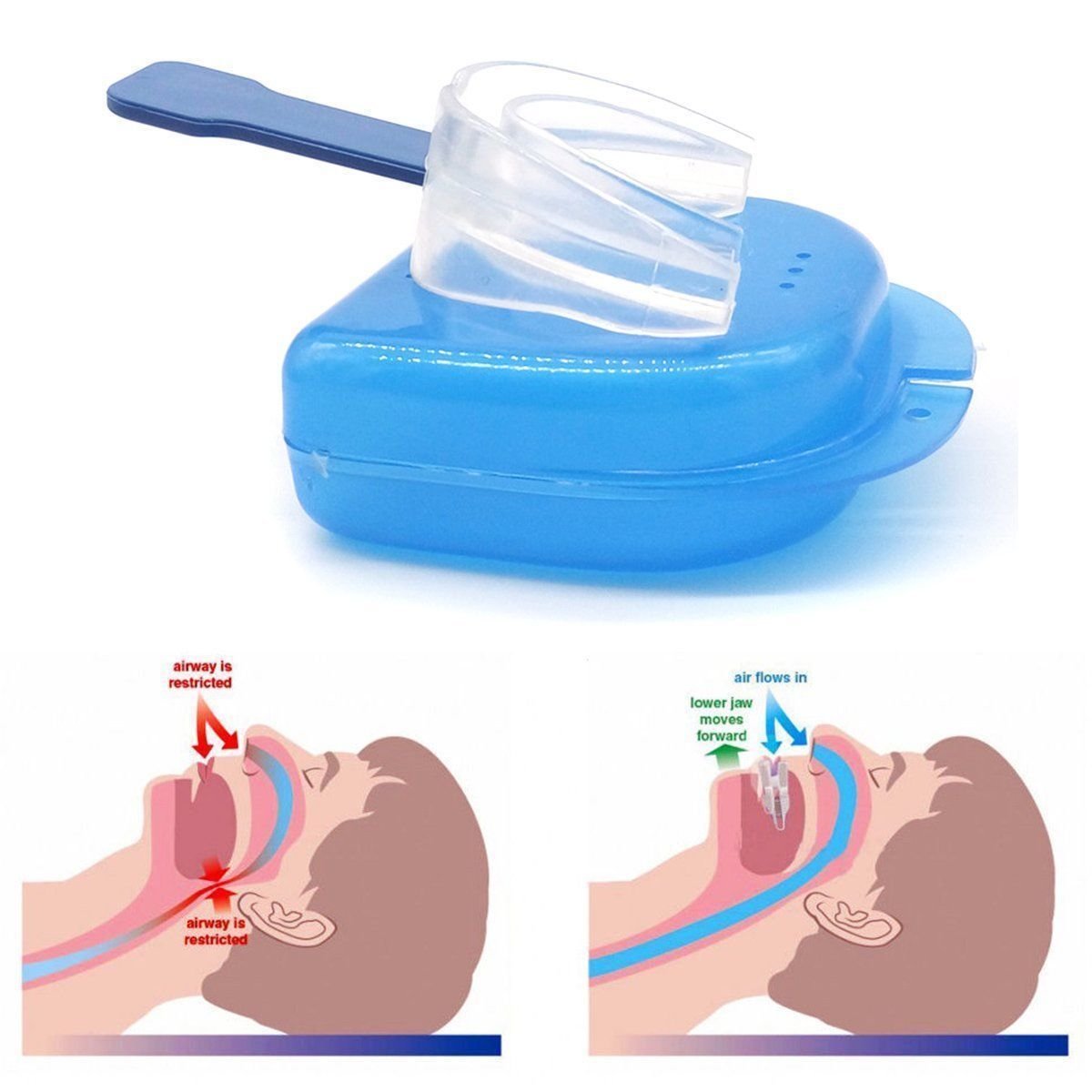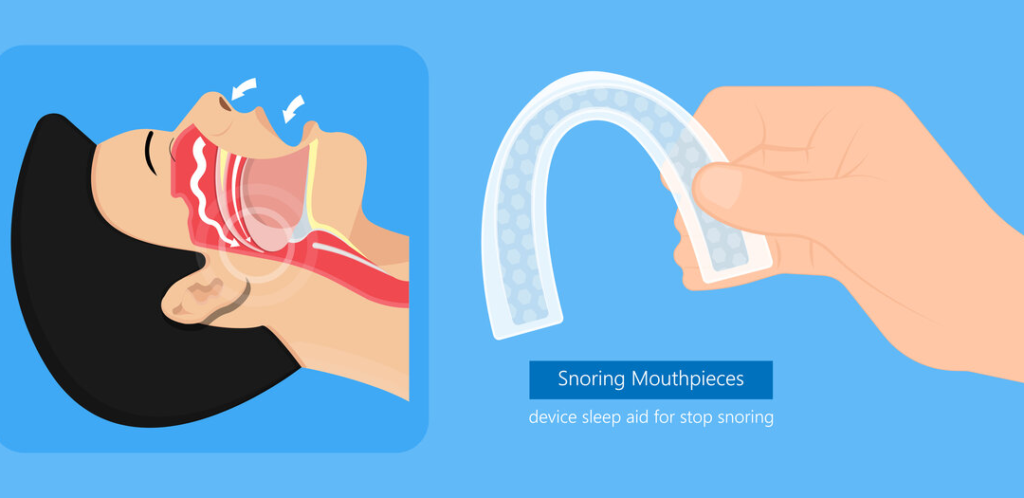Finding a solution to snoring is not just about getting a quieter night’s sleep but also improving overall health and well-being. Snoring mouthguards offer a promising remedy, but understanding their efficacy and nuances is crucial.
In this comprehensive guide, we’ll delve into:
- How snoring mouthguards improve sleep quality
- Effectiveness and benefits
- Factors to consider when choosing a snoring mouthguard
Understanding snoring
Snoring affects millions of people worldwide, disrupting sleep and leading to daytime fatigue and other health issues. Understanding the causes and mechanisms of snoring is crucial in finding effective solutions. Snoring occurs when airflow through the mouth and nose is partially obstructed during sleep, causing the surrounding tissues to vibrate and produce noise. Factors such as sleeping position, weight, nasal congestion, and alcohol consumption can exacerbate the problem. Fortunately, mouthguards are an effective solution to alleviate snoring and improve sleep quality. Additionally, specialized mouthguards for braces provide comfortable and effective snoring relief while accommodating orthodontic treatment.
Definition and causes of snoring
Snoring is the sound produced when the flow of air through the mouth and nose is partially obstructed during sleep, causing the surrounding tissues to vibrate.
Several factors contribute to snoring, including:
- Anatomical factors: Enlarged throat tissues, a long uvula, or a deviated septum can narrow the airway, leading to increased vibrations.
- Obesity: Excess weight, particularly around the neck, can squeeze the airway and make breathing difficult.
- Sleeping position: Lying on the back can cause the tongue to fall backward into the throat, blocking airflow.
- Nasal congestion: Allergies, colds, or sinus infections can obstruct nasal passages, forcing mouth breathing, which is more likely to cause snoring.
- Alcohol and sedatives: These relax the muscles of the throat, increasing the likelihood of airway obstruction.
- Aging: Muscle tone decreases with age, contributing to narrower airways and increased snoring.
Impact of snoring on sleep quality and overall health
Snoring can significantly impact sleep quality and overall health, affecting both the snorer and those around them.
Effects on sleep quality:
- Frequent awakenings: Snorers may wake up multiple times throughout the night due to airway obstructions, leading to poor sleep continuity.
- Reduced REM sleep: Snoring can interfere with the rapid eye movement (REM) stage of sleep, which is critical for cognitive functions such as memory and learning.
- Daytime fatigue: Poor sleep quality results in persistent tiredness during the day, affecting productivity and mood.
Health implications:
- Cardiovascular problems: Chronic snoring, especially when associated with obstructive sleep apnea (OSA), increases the risk of high blood pressure, heart disease, and stroke.
- Cognitive decline: Interrupted sleep affects concentration, decision-making, and overall cognitive function, potentially leading to long-term cognitive decline.
- Mental health issues: Lack of quality sleep is linked to anxiety, depression, and irritability, impacting overall mental well-being.
- Metabolic disorders: Poor sleep can lead to weight gain and increase the risk of developing type 2 diabetes due to its effects on insulin sensitivity and metabolism.
- Relationship strain: The noise from snoring can disturb a partner’s sleep, causing frustration and tension within relationships.
Snoring mouthguards explained
Snoring mouthguards, also known as oral appliances or mandibular advancement devices (MADs), are innovative solutions designed to tackle the disruptive problem of snoring. These devices work by gently repositioning the lower jaw forward during sleep, which helps to keep the airway open and prevents the collapse of soft tissues in the throat that leads to snoring. By effectively maintaining the patency of the airway, snoring mouthguards mitigate the vibrations and turbulent airflow that cause the characteristic snoring sound. They offer a non-invasive and convenient alternative to more intrusive interventions like surgery or continuous positive airway pressure (CPAP) machines, making them increasingly popular among snorers seeking relief. Whether obtained through a dentist for a custom fit or purchased over-the-counter, these devices have demonstrated efficacy in reducing snoring frequency and severity, thus improving sleep quality not only for the snorer but also for their sleep partners.

What are snoring mouthguards and how they work
Snoring mouthguards also referred to as oral appliances or mandibular advancement devices (MADs), are specialized devices designed to address the issue of snoring. They are typically made from soft, flexible materials and are custom-fitted to the individual’s mouth for optimal comfort and effectiveness. These devices work by repositioning the lower jaw slightly forward during sleep, which helps to keep the airway open and prevent the collapse of soft tissues in the throat. By maintaining proper airflow, snoring mouthguards reduce the vibrations and turbulent airflow that cause snoring, resulting in quieter and more restful sleep for both the snorer and their sleep partner.
Different types of snoring mouthguards available
There are several types of snoring mouthguards available, each with its unique design and mechanism of action, catering to the diverse needs of individuals seeking relief from snoring.
- Over-the-counter anti-snoring mouthguards:
These ready-made devices are designed for convenience and accessibility, offering a non-prescription solution to snoring.
Typically available in a one-size-fits-all or boil-and-bite design, they can be easily adjusted at home to fit various mouth shapes and sizes.
While they may offer immediate relief for some users, their effectiveness may vary compared to custom-made alternatives.
- Custom-made anti-snoring mouthguards:
Precision-crafted by dental professionals, custom-made mouthguards offer a personalized solution tailored to the individual’s mouth anatomy.
Through a detailed fitting process involving impressions of the teeth and jaw, these devices ensure optimal comfort and effectiveness.
Custom-made mouthguards can incorporate specific features, such as mandibular advancement or tongue retention, to address unique snoring patterns.
While they may involve a higher initial cost and require a visit to the dentist, custom-made mouthguards often provide superior and longer-lasting results compared to over-the-counter options.
Effectiveness of snoring mouthguards
Snoring mouthguards have proven effective in reducing both the frequency and intensity of snoring for many individuals. These devices work by gently repositioning the lower jaw forward during sleep, which helps to keep the airway open and prevent the collapse of soft tissues in the throat that lead to snoring. By maintaining proper airflow, snoring mouthguards mitigate the vibrations and turbulent airflow that cause the characteristic snoring sound. Studies have shown that snoring mouthguards can significantly improve sleep quality for both the snorer and their sleep partner, leading to quieter nights and reduced daytime fatigue.
Overview of how snoring mouthguards are custom-fitted and used
Snoring mouthguards undergo a detailed fitting process to ensure they are customized to the individual’s mouth anatomy, providing optimal comfort and effectiveness. The custom-fitting process typically involves the following steps:
- Consultation: The individual meets with a dentist or dental specialist to discuss their snoring concerns and undergo an assessment of their dental health. During this consultation, the dentist gathers information about the individual’s snoring patterns and overall oral anatomy.
- Impressions: Impressions of the individual’s teeth and jaw are taken using dental putty or digital scanning technology. These impressions capture the exact contours of the mouth, providing the basis for creating a custom-fitted mouthguard.
- Customization: Based on the impressions, the mouthguard is custom-crafted to fit the unique shape and size of the individual’s mouth. Dental technicians use specialized materials to fabricate the mouthguard, ensuring it is durable, flexible, and comfortable to wear during sleep.
- Fitting: Once the mouthguard is fabricated, the individual returns to the dentist for a fitting session. During this appointment, the dentist ensures that the mouthguard aligns properly with the individual’s teeth and jaw. Any necessary adjustments are made to ensure a snug and secure fit.
- Usage: The individual wears the custom-made mouthguard during sleep, following the dentist’s instructions for optimal usage and maintenance. Typically, the mouthguard is inserted into the mouth before bedtime and removed upon waking.
Benefits of using snoring mouthguards
Snoring mouthguards offer a range of benefits for individuals seeking relief from snoring and improved sleep quality:
Improved airflow and reduction of snoring vibrations
Snoring mouthguards work by gently repositioning the lower jaw forward during sleep, helping to keep the airway open and prevent the collapse of soft tissues in the throat that lead to snoring.
Enhanced sleep quality and daytime alertness
By reducing snoring frequency and intensity, snoring mouthguards promote deeper and more restorative sleep, leading to improved sleep quality and daytime alertness.
Individuals who use snoring mouthguards often report feeling more refreshed and energized upon waking, with reduced daytime fatigue and drowsiness.
Potential benefits for partners and relationships
Snoring can not only disrupt the snorer’s sleep but also affect the sleep quality of their partner.
By reducing snoring noise, snoring mouthguards can significantly improve the sleep quality of both the snorer and their sleep partner.

Factors to consider when choosing a snoring mouthguard
When selecting a snoring mouthguard, several factors should be taken into account to ensure optimal effectiveness and comfort.
Cost considerations and insurance coverage
Evaluate the cost of both over-the-counter and custom-made mouthguards, considering any potential insurance coverage or reimbursement options.
While over-the-counter options may be more affordable upfront, custom-made mouthguards often offer superior results and long-term value.
Comfort and fit
Prioritize comfort and fit when choosing a snoring mouthguard. Custom-made mouthguards typically provide a more precise fit and greater comfort compared to over-the-counter alternatives.
Consider the materials used in the construction of the mouthguard and ensure they are durable yet flexible enough to maintain comfort during sleep.
Effectiveness
Assess the effectiveness of the mouthguard in reducing snoring frequency and intensity. Look for reviews and clinical studies supporting the device’s efficacy.
Custom-made mouthguards, tailored to the individual’s mouth anatomy, often offer superior effectiveness compared to one-size-fits-all options.
Maintenance and durability
Evaluate the maintenance requirements and durability of the mouthguard. Determine if the device requires regular cleaning or adjustments to maintain its effectiveness over time.
Custom-made mouthguards may offer greater durability and longevity compared to over-the-counter options.
Risks and side effects
Understand the potential risks and side effects associated with using a snoring mouthguard. Common side effects may include jaw discomfort, excessive salivation, or tooth movement.
Consult with a healthcare professional if you experience any adverse effects while using the mouthguard.
Conclusion
Snoring mouthguards offer a simple yet effective solution to the disruptive problem of snoring, benefiting both the snorer and their sleep partner. By repositioning the jaw and tongue to maintain airflow and reduce vibrations, these devices improve sleep quality, enhance daytime alertness, and promote overall well-being. Whether obtained over-the-counter or custom-made through a dentist, snoring mouthguards provide a non-invasive and convenient option for managing snoring and transforming sleep experiences. When choosing a snoring mouthguard, factors such as cost, comfort, effectiveness, oral health compatibility, maintenance, and potential risks should be carefully considered to ensure optimal results.
FAQ
Are snoring mouthguards results permanent?
The effectiveness of snoring mouthguards can vary depending on individual factors such as the severity of snoring, anatomical features, and adherence to usage. While snoring mouthguards can provide long-term relief for many individuals, the results may not be permanent.
Do snoring mouthguards work for everyone?
Snoring mouthguards are a popular and effective option for managing snoring, but their efficacy can vary from person to person. Factors such as the underlying cause of snoring, mouth and jaw anatomy, and individual response to treatment may influence the effectiveness of snoring mouthguards.
Can snoring mouthguards be used in combination with other sleep remedies?
Yes, snoring mouthguards can be used in combination with other sleep remedies to enhance effectiveness and address specific needs. For example, individuals with obstructive sleep apnea (OSA) may use snoring mouthguards in conjunction with continuous positive airway pressure (CPAP) therapy for comprehensive treatment.
Author of this blog post:
Anye Tchouli Calne Forkob Linkedin

Anye Tchouli Calne Forkob is a medical student at the University of Buea and a Health Sciences student at the University of the People. He is passionate about community health outreach, self-care, and healthy lifestyle and aims to bridge the knowledge gap in the health sector.
Published by Toothhealth Team


